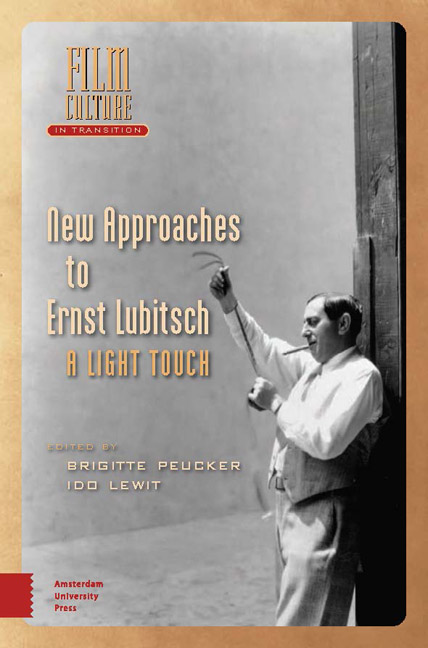6 - Lubitsch’s May McAvoy Trilogy: Threesomes, Triangles, Allegories
Published online by Cambridge University Press: 16 April 2024
Summary
Abstract
Lubitsch used triangles as a plot device, but also as the basis for his artistic play with form, especially in his three films featuring May McAvoy. It is most clearly in evidence in Three Women (1924), which makes explicit the principle of threes in its title and plot. This essay explores the principle on a formal level, but expands the idea to suggest that Lubitsch's play with threes extends beyond the films themselves: beneath his playfulness is a tendentious joke directed at Warner Brother executives who were rapacious womanizers. Considering Lady Windermere's Fan (1925) against Three Women reveals a series of remarkable continuities and inversions that extend to the film Lubitsch planned to direct, but did not––The Jazz Singer.
Keywords: May McAvoy, Warner Brothers, silent film, comedy, jokes.
Sabine Hake, whose Passions and Deceptions remains a wonderfully insightful book on the silent films of Ernst Lubitsch, responded to my query about the print sources she used when analyzing Lubitsch's Three Women (Lubitsch, 1924) by remarking: “so interesting that there is this renewed interest in Lubitsch—not sure why.” Certainly, recent Lubitsch biographers have considered Three Women an unlikely starting point for an investigation that might renew our interest: Joseph McBride's 2018 treatment of Lubitsch characterized the film as “shallow melodramatic fare,” and suggested that Lubitsch may have “lacked a feeling of genuine creative involvement.” In his 2020 examination of the transnational Lubitsch, Rick McCormick dismissed the film in a single paragraph. Admittedly, my decision to pursue this topic is embarrassingly idiosyncratic: This is my third essay on Ernst Lubitsch and his films with Warner Brothers in the mid-1920s. Returning to this group of six films––one of which (Kiss Me Again, 1925) is lost and another of which (The Jazz Singer, Alan Crosland, 1927) was directed by someone else, my attention was drawn to the newly available restoration of Three Women, Lubitsch's second film for Warner Brothers. There was a certain coincidental charm between my “three essays” and Lubitsch's Three Women, but it was also the first of three Lubitsch films to star May McAvoy.
- Type
- Chapter
- Information
- New Approaches to Ernst LubitschA Light Touch, pp. 123 - 140Publisher: Amsterdam University PressPrint publication year: 2024



